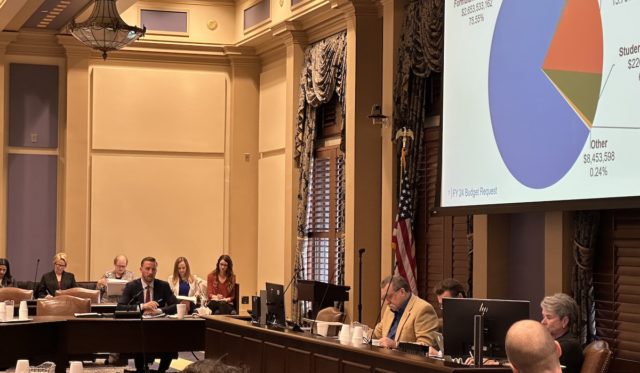
Legislators from both chambers grilled State Superintendent of Public Instruction Ryan Walters on his budget request today after a weeklong saga in which Walters first presented a budget request he actually hoped to change, succeeded in changing it, and finally offered it to lawmakers.
Walters presented his revised Fiscal Year 2024 budget request to members of both the House and Senate appropriations and budget education subcommittees at a joint hearing this morning.
In an added twist, some lawmakers are now wondering whether the Oklahoma State Department of Education could be on the hook for hundreds of thousands of misspent federal education dollars after Attorney General Gentner Drummond announced Tuesday that he was dropping a lawsuit against Florida-based company ClassWallet. Drummond said he instead would pursue accountability for state officials, potentially including Walters owing to his prior role as director of an organization tasked with dispersing the funds.
House Appropriations and Budget Education Subcommittee Chairman Mark McBride (R-Moore) mentioned the Governor’s Emergency Education Relief funds debacle in his first question to Walters after the superintendent had concluded his presentation.
“Attorney General Drummond made the decision to drop the lawsuit against ClassWallet and the federal Department of Education, but they’re still seeking repayment for the illegitimate purchases,” McBride said. “Does your budget contain funding to pay these funds back to the federal government?”
Walters declined to specify if the agency has discussed the possibility of paying at least $650,000 back to the federal government.
“Yes sir, thank you for the question, Rep. McBride,” Walters began. “My staff and I are currently looking over the attorney general’s comments, and we’ll continue to work together to work with him on what the next steps are with that.”
McBride pushed back, asking Walters if he had the same answer in his secretary of education capacity, a Cabinet position he holds in addition to leading OSDE.
“Yes sir,” Walters said again. “We’re working with the governor’s office to continue to figure out what next steps will be as we’re reviewing the attorney general’s comments and develop what the next steps for the state will be.”
After the meeting, McBride said he felt he did not get a clear answer on his concerns and that he is irritated the situation — involving a federal audit that revealed families allegedly misspent thousands of dollars on educational relief money and accused the state of not exercising proper oversight — has not been resolved.
“I think we need some answers,” McBride said. “It was told to me we had it taken care of last fall. And obviously it’s not.”
Two budget requests
The rest of the lawmakers’ questions during Wednesday’s two-hour meeting mostly dealt with Walters’ two big asks in his budget request: a merit-based teacher pay raise and a comprehensive early childhood literacy program. Walters asked for $150 million to cover the cost of the pay raise, which would award “the best and brightest teachers” based on their Teacher and Leader Effectiveness evaluation score and on the number of professional learning hours they have completed.
For his reading program, which he called his “number one ask,” Walters proposed a new act to the Legislature, called the Every Kid Reads Recovery Act (EKRRA). Walters’ budget request asks for $100 million to cover the cost of the program.
Walters’ requests are not binding on the Legislature, and lawmakers could choose to completely disregard the proposals Walters presented as they craft next year’s state budget this session, which starts Monday. However, Walters’ requests represent some of his early priorities for the department as he begins his new position.
Walters argued that the two proposals go “hand-in-hand,” with the incentive program keeping more teachers in the profession longer so they can receive the training necessary to implement the reading program.
“We need structural changes to the way that our schools are operating, on the way that they’re recruiting (and) retaining teachers, on the way that they’re implementing strategies around reading,” Walters said. “And this will be (an) obviously significant investment, but it is a comprehensive overhaul of our schools — how we teach reading and how we get people trained in best practices.”
The EKRRA proposal would include eight different initiatives that aim to address training teachers to teach the Science of Reading, a curriculum that teaches students phonics; as well as addressing dyslexia intervention in young students and teacher recruitment.
Walters also took the opportunity with some of the lawmakers’ questions to expound on campaign rhetoric, including addressing questions regarding his “liberal indoctrination” comments and past declarations to get federal funding out of Oklahoma public education.
“I observed that you opened your remarks with references to critical race theory (and) liberal indoctrination,” Rep. John Waldron (D-Tulsa) said. “I can tell you that teachers that I’ve spoken with are scared, discouraged, angered and intimidated by that kind of rhetoric coming from our state leadership. (…) Can I get your assurance that you’re going to drop the campaign rhetoric surrounding teachers?”
Walters declined to do so.
“I absolutely will not apologize, nor will I ever apologize for speaking on behalf of Oklahoma parents,” Walters said. “Oklahoma parents have told me in every county in the state that one of their biggest concerns are liberal activists in the classroom.”





















